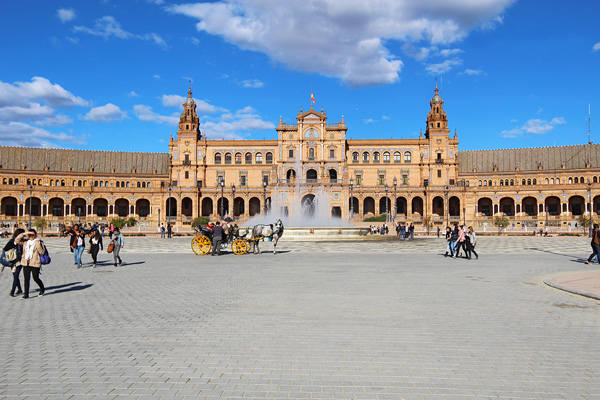Cost of Living in Seville
Summary: If you're moving to Seville, understanding the the cost of living in Seville helps you know what to expect when it comes to apartment or house hunting, grocery shopping, transportation, dining out, utilities and more.

| Category | Cost |
|---|---|
| Apartment Rentals | Rental prices in Seville vary depending on the location and size of the apartment. On average, a one-bedroom apartment in the city center costs around €700-€800 per month, while the same outside the city center costs around €500-€600. A three-bedroom apartment in the city center can cost around €1,200-€1,500 per month, and outside the city center, it can cost around €800-€1,000. |
| Apartment Purchases | The price of buying an apartment in Seville also depends on the location and size. On average, the price per square meter in the city center is around €2,500-€3,000, while outside the city center, it's around €1,500-€2,000. Therefore, a 70 square meter apartment in the city center can cost around €175,000-€210,000, and outside the city center, it can cost around €105,000-€140,000. |
| Transportation | Public transportation in Seville is quite affordable. A one-way ticket costs around €1.40, and a monthly pass costs around €40. Taxis start at around €3.50, with an additional €1 per kilometer. If you prefer to drive, gasoline costs around €1.30 per liter. |
| Groceries | The cost of groceries in Seville is reasonable. A liter of milk costs around €0.80, a loaf of bread costs around €1, a dozen eggs cost around €2, and a kilogram of chicken breasts costs around €7. Fruits and vegetables are also quite affordable, with a kilogram of apples or bananas costing around €1.50, and a kilogram of tomatoes or potatoes costing around €1. |
| Restaurants | A meal at an inexpensive restaurant in Seville costs around €10-€15, while a three-course meal for two at a mid-range restaurant costs around €40-€60. A regular cappuccino costs around €1.50, and a 0.5 liter domestic beer costs around €2. |
| Utilities | Basic utilities for an 85 square meter apartment, including electricity, heating, cooling, water, and garbage, cost around €100-€150 per month. Internet costs around €30-€50 per month. |
| Private School Tuition | Private school tuition varies greatly depending on the school. On average, annual tuition for preschool costs around €4,000-€6,000, for elementary school around €6,000-€8,000, for middle school around €8,000-€10,000, and for high school around €10,000-€12,000. |
Monthly Budget for Retirees in Seville
"The cost of living in Seville is considered to be lower than in many other major Spanish cities. Rent for a one-bedroom apartment in the city center can be quite affordable, while outside the city center, it can be even cheaper. The cost of utilities such as electricity, heating, cooling, and water is also relatively low. Groceries in Seville are reasonably priced, with local markets offering fresh produce, meat, and fish at competitive rates. Eating out in Seville can be inexpensive as well, especially if you take advantage of the local tradition of tapas, small plates of food often served free with drinks. Public transportation in Seville is efficient and affordable, with options including buses, trams, and a metro system. Taxis are also available and are reasonably priced. Healthcare in Spain is generally of a high standard and is free for residents working in Spain. However, private health insurance is also available at a reasonable cost. Overall, the cost of living in Seville is quite manageable, making it an attractive option for those looking to live in a vibrant, historic city with a rich culture and pleasant climate," said one expat living in Seville.
Can I live in Seville on $1,500 a month?
"I've been living in Seville for a few years now and I can tell you that it's definitely possible to live comfortably on $1,500 a month, but it does require some budgeting and sacrifices. For instance, you might not be able to dine out at high-end restaurants or go on frequent shopping sprees. But, if you're okay with living a bit more modestly, you can definitely make it work. In terms of housing, you'll want to avoid the more expensive neighborhoods like El Arenal or Santa Cruz. These are beautiful areas, but the cost of living is significantly higher. Instead, consider looking at neighborhoods like Triana or Los Remedios. These areas are still very nice, but the cost of rent is much more affordable. You can find a decent one-bedroom apartment in these areas for around $600-$700 a month. Groceries are relatively cheap in Seville, especially if you shop at local markets. You can expect to spend around $200-$300 a month on groceries. Utilities, including electricity, water, and internet, will likely cost you around $100-$150 a month. Public transportation is also very affordable in Seville. A monthly pass for the bus and metro costs around $40. If you prefer to drive, keep in mind that gas prices in Spain are higher than in the U.S., and parking can be a challenge in the city center. Healthcare in Spain is excellent and affordable. If you're working in Spain, you'll be covered by the national health system. If not, you can get private health insurance for around $100 a month. Entertainment, like going to the movies or out for drinks, is also quite affordable. A movie ticket costs around $8 and a beer at a local bar is usually around $2-$3. So, if you budget carefully, you can definitely live comfortably in Seville on $1,500 a month. It might not be a life of luxury, but it's a good life nonetheless," commented an expat living in Seville.
Can I live in Seville on $3,500 a month?
"I've been living in Seville for a few years now and I can tell you that it's definitely possible to live comfortably on $3,000 a month, even if you're used to modern amenities. The cost of living here is quite reasonable compared to many other European cities. For instance, a one-bedroom apartment in the city center would cost you around $700-$800 per month, while outside the city center, it would be around $500-$600. Utilities and internet would add another $150-$200 to your monthly expenses. Groceries are also quite affordable. You can expect to spend around $200-$300 per month if you cook at home. Eating out is also not too expensive, with a meal at an inexpensive restaurant costing around $10-$15. As for transportation, a monthly pass for public transport costs around $40. If you prefer to drive, gasoline costs around $1.30 per liter. Now, if you're looking for affordable neighborhoods, I would recommend Los Remedios or Triana. They're both safe, have good amenities, and are not too far from the city center. On the other hand, neighborhoods like Santa Cruz or El Arenal are quite expensive and might not fit into your budget. Of course, you'll have to make some sacrifices. For instance, you might not be able to dine out at high-end restaurants or go on expensive trips every weekend. But overall, I think you'll find that life in Seville is quite comfortable and affordable," said one expat living in Seville.
Can I live in Seville on $5,000 a month?
"I've been living in Seville for a few years now and I can tell you that living on $5,000 a month is not only possible, but you can live quite comfortably. Of course, it all depends on your lifestyle and what you consider to be 'modern amenities'. For instance, if you're used to having a private gym, a pool, and a doorman, then you might have to adjust your expectations a bit. But if you're okay with a nice, comfortable apartment in a good neighborhood, then you'll be more than fine. The cost of living in Seville is quite reasonable compared to other European cities. You can rent a nice one-bedroom apartment in the city center for around $800 to $1,000 a month. If you're willing to live a bit further out, in neighborhoods like Los Remedios or Nervión, you can find even cheaper options. These are nice, safe areas with plenty of shops, restaurants, and parks. On the other hand, if you're looking at neighborhoods like Santa Cruz or El Arenal, which are right in the heart of the city, you might find the rents to be a bit higher. These areas are beautiful and full of history, but they're also very popular with tourists, which drives up the prices. As for other expenses, groceries will probably run you around $300 a month, depending on how much you eat out. A meal at a mid-range restaurant costs around $15 to $20, so if you eat out every day, that can add up. But there are also plenty of cheaper options, like tapas bars, where you can get a small dish and a drink for around $3 to $5. Utilities, including electricity, water, and internet, will probably cost you around $200 a month. Public transportation is also quite affordable, with a monthly pass costing around $40. So, all in all, I'd say that you can live quite comfortably in Seville on $5,000 a month. You might not be able to afford a luxury penthouse in the city center, but you can definitely afford a nice, comfortable apartment in a good neighborhood, and you'll have plenty left over for eating out, entertainment, and other expenses," commented an expat living in Seville.
About the Author
 Joshua Wood, LPC joined Expat Exchange in 2000 and serves as one of its Co-Presidents. He is also one of the Founders of Digital Nomad Exchange. Prior to Expat Exchange, Joshua worked for NBC Cable (MSNBC and CNBC
Primetime). Joshua has a BA from Syracuse and a Master's in Clinical and Counseling Psychology from Fairleigh Dickinson University. Mr. Wood is also a licensed counselor and psychotherapist.
Joshua Wood, LPC joined Expat Exchange in 2000 and serves as one of its Co-Presidents. He is also one of the Founders of Digital Nomad Exchange. Prior to Expat Exchange, Joshua worked for NBC Cable (MSNBC and CNBC
Primetime). Joshua has a BA from Syracuse and a Master's in Clinical and Counseling Psychology from Fairleigh Dickinson University. Mr. Wood is also a licensed counselor and psychotherapist.
Some of Joshua's articles include Pros and Cons of Living in Portugal, 10 Best Places to Live in Ireland and Pros and Cons of Living in Uruguay. Connect with Joshua on LinkedIn.




